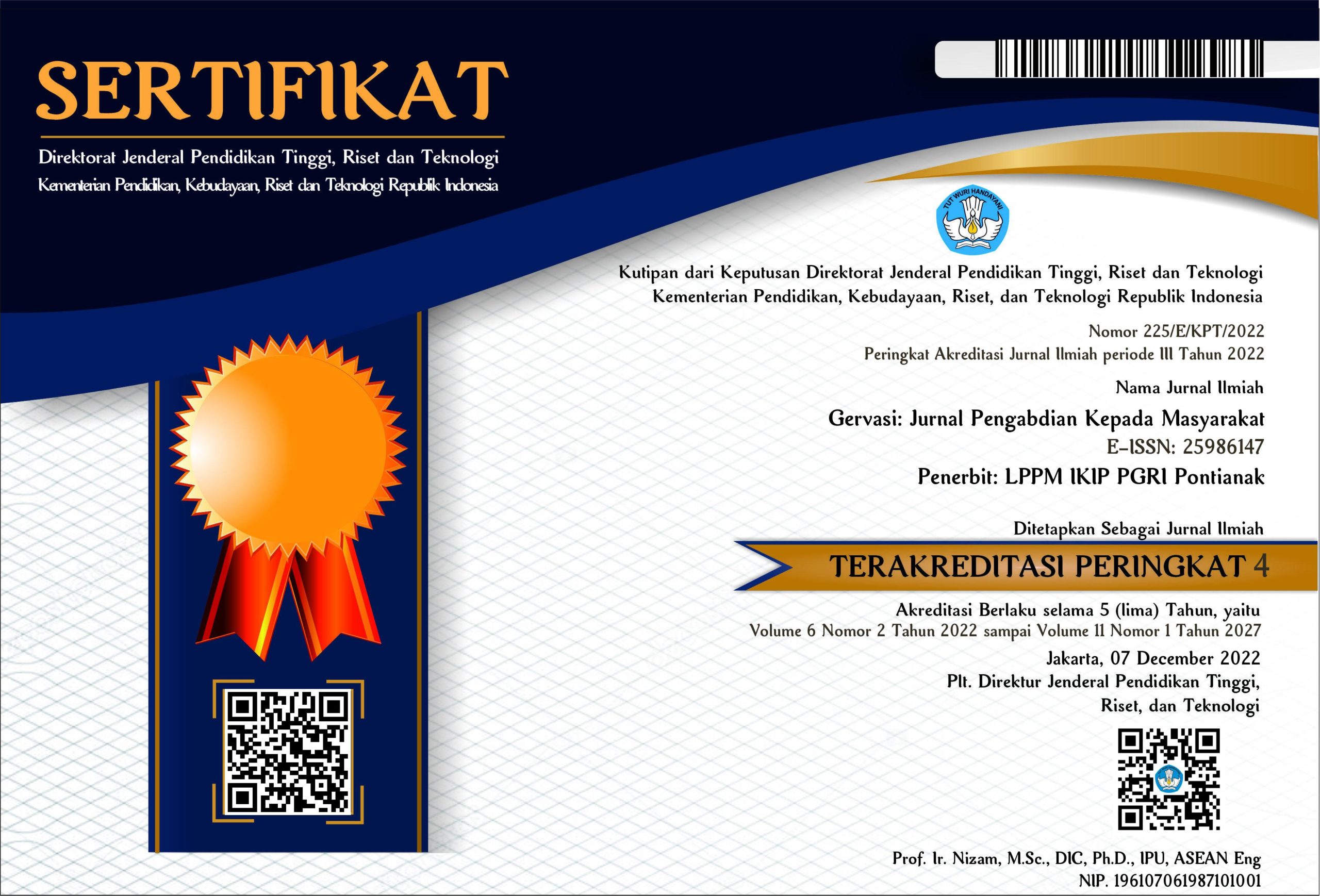PROGRAM BALITA SEHAT AKTIF, KADER OKE DAN KOMPETEN (BETAKAROTEN) DI WILAYAH RW 10 SRONDOL KULON KOTA SEMARANG
DOI:
https://doi.org/10.31571/gervasi.v4i1.1596Keywords:
program gizi balita, gizi kurang, kurus, pelatihan kaderAbstract
Downloads
References
Ana, V., Setyawati, V., & Herlambang, B. A. (2015). Model edukasi gizi berbasis e-booklet untuk meningkatkan pengetahuan gizi ibu balita. Jurnal Informatika UPGRIS, 1(Juni), 86–94.
Asosiasi Dietisien Indonesia (ASDI), Ikatan Dokter Anak Indonesia (IDAI), & Persatuan Ahli Gizi Indonesia (PERSAGI). (2014). Penuntun diet anak. (3rd ed.). Badan Penerbit FKUI.
Bappenas. (2009). Pedoman umum pengembangan anak usia dini holistik-integratif.
Bidayati, U. (2018). Commitment, motivation, and performance of posyandu cadres. international conference of organizational innovation (ICOI 2017), 131(May). (Online), (https://doi.org/10.2991/icoi-17.2017.27).
Departemen Kesehatan RI. (2006). Kelompok kerja posyandu, pedoman umum pengelolaan posyandu. Jakarta: Departemen Kesehatan RI.
Dewi, M., & Aminah, M. (2016). Pengaruh edukasi gizi terhadap feeding practice ibu balita stunting usia 6-24 bulan (the effect of nutritional knowledge on feeding practice of mothers having stunting toddler aged 6-24 months). Indonesian Journal of Human Nutrition, 3(1), 1–8.
Dewi, R., & Anisa, R. (2018). The influence of posyandu cadres credibility on community participation in health program pengaruh kredibilitas kader posyandu terhadap partisipasi masyarakat pada program kesehatan. The Messenger, 10(1), 83–92. (Online), (https://doi.org/10.26623/themessenger.v10i1.596).
Dinas Kesehatan Kota Semarang. (2016). Profil kesehatan kota Semarang.
Kartika, Mufida, N., Karmila, & Marlina. (2018). Factors affecting kader role in achievement nutrition improvement in toddlers in. Jurnal Kesehatan Global, 1(2), 45–51.
Kementerian Kesehatan. (2011). Pedoman umum pengelolaan posyandu.
Kementerian Kesehatan. (2018). Riset kesehatan dasar.
Pratiwi, H., & Bahar, H. (2016). Peningkatan pengetahuan, sikap, dan tindakan ibu dalam upaya pencegahan gizi buruk pada balita melalui metode konseling gizi di wilayah kerja Puskesmas Wua-wua Kota Kendari Tahun 2016. Jurnal Ilmiah Mahasiswa Kesehatan Masyarakat, 1(3), 1–8.
Purwanti, R. (2019). Peningkatan kapasitas kader posyandu: cegah stunting dengan perbaikan gizi 1000 HPK. Ethos: Jurnal Penelitian Dan Pengabdian Kepada Masyarakat, 7(2), 182–189.
Purwanti, R., Wati, E. K., & Rahardjo, S. (2016). Karakteristik keluarga yang berhubungan dengan status gizi balita umur 6 - 59 bulan. Jurnal Gizi Indonesia, 5(1), 50–54.
Siagian, C. M., & Halisitijayani, M. (2015). Mother’s knowledge on balanced nutrition to nutritional status of children in puskesmas (public health center) in the district of pancoran, southern Jakarta 2014. International Journal of Current Microbiology and Applied Studies, 4(7), 815–826.
Stefanus Supriyanto, & Nyoman Anita Damayanti. (2007). Perencanaan dan evaluasi. Surabaya: Airlangga University Press.
Wisnuwardani, R. W. (2018). Insentif dan kinerja kader posyandu jurnal kesehatan masyarakat, (July 2013).
Wiwitan, T., Trigartanti, W., Hernawati, R., Ilmu, F., Unisba, K., & Tamansari, J. (2008). Konsep “corporate social responsibility†dalam kegiatan “community relations". MIMBAR, XXIV(2), 151–164.
World Health Organization. (1995). Kader kesehatan Masyarakat. Jakarta: Penerbit Buku Kedokteran EGC.
Yabancı, N., Kısaç, İ., & Karakuş, S. Ş. (2014). The Effects of mother’s nutritional knowledge on attitudes and behaviors of children about nutrition. procedia-social and behavioral sciences, 116, 4477–4481. (Online) (https://doi.org/10.1016/j.sbspro.2014.01.970).
Downloads
Published
How to Cite
Issue
Section
License
Authors who publish with this journal agree to the following terms:
- Authors retain copyright and grant the journal right of first publication with the work simultaneously licensed under a Creative Commons Attribution License (CC BY-SA 4.0) that allows others to share the work with an acknowledgment of the work's authorship and initial publication in this journal.
- Authors are able to enter into separate, additional contractual arrangements for the non-exclusive distribution of the journal's published version of the work (e.g., post it to an institutional repository or publish it in a book), with an acknowledgment of its initial publication in this journal.
- Authors should sign the copyright transfer agreement when they have approved the final proofs sent by GERVASI prior to the publication.

 Download: 183
Download: 183











